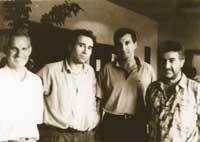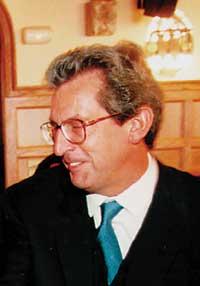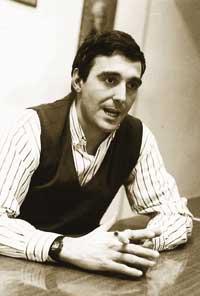Praise to the EU of silver
1997/05/01 Kaltzada, Pili - Elhuyar Zientziaren Komunikazioa Iturria: Elhuyar aldizkaria
Martin Orbe
Without a doubt, when talking about the UEU, we should first mention the name and the fact that it has obtained between the normalization of Basque and the spaces referring to Basque culture. But any initiative, and if special, also allows other reflections. Here, for my part, one or the other.
North crib
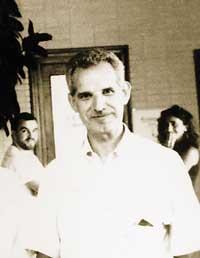
Faced with the political situation, the EU took its first steps across the Bidasoa. Thus Basque literature emerges in the same environment. Iparralde has once again given Basque the “thornuy you need”, claimed by Etchepare. Leçarraga recalled “the town of the heuscal” and Axular, without forgetting one, left Laphurdi, one of the towns that mentioned from Navarre to Alava.
It is a fascinating principle for those of us who believe that Euskal Herria has its ancient and deep roots of being a people, therefore, a people, in something that is much more typical of the Monarchies, of direct or indirect inheritances, of conquests, of exchanges or annexations between States, of international declarations and agreements, and that extends until the dark night of the times. Although, again, with the Axulars “they have different kingdoms”.
We therefore have one of the flows of the first phase of the EU: He took the first steps in Lapurdi, until the twenty-fifth year of consolidation and permanence in Navarra, and doubled them in Pamplona and Bayonne to act.
On the one hand, the take-off to speak proudly and, on the other, because the “kingdoms” remain “differents”, a sample of the oats and unifications that we have ahead. To see when there is no news to highlight that in Iparralde or Navarra anything corresponding to the Basque Country has been created or located.
Militancy area
This is not the best place to start praising the militancy. On the other hand, it took place in difficult times of militancy, but I think it has become something that today has been totally overcome or is considered necessary to overcome.
It is true that any area of urbanism, and therefore also the fields of language and culture, are human and social activities to reach the recognition of the full officialdom and manage from the status of the public. Hence the efforts of the Basque industry, using the most human and economic means.
But the truth is that Euskalgintza has many deficiencies and geographical and social gaps, which have no answer by official channels and which, in my opinion, cannot in the current government, because the best status that can be achieved, necessarily, has to be at a clear disadvantage, facing a recognized and strong situation of the Castilian population. From the government and normalization we have to continue to reclaim and channel what we still cannot by popular initiative.
I would mention two, in this broader area, among the contributions of the EU. On the one hand, in the field of knowledge chosen by many people, in Basque and in the Basque sense, a space has been created to channel their desire to dress. This is how the militant work of the EU is understood. Missionary militancy in solitude is not the most fruitful militancy. We need important and attractive spaces of militancy. On the other hand, it is seen as something related to the enthusiasm of young people militancy. That is the stereotype. But fortunately the EU has received wider militancy. The presence and teaching of adults and of renown and perseverance have been present from the beginning in the EU programs.
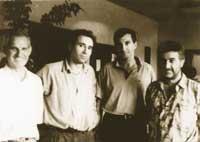
And they have been more than one and two. I had the opportunity to meet the top down militants. Those of me who approached the militancy as a system of diligence have to recognize that what touched me most was the strength of the militancy that I found and lived in this initiative. Militants endowed with human talent in the efforts to build our future, to bravely stop the fear and uncertainty that brings us back to discouragement. These have been and are the true pillars of the EU.
The challenge of quality
When, instead of wanting to advance in Euskalgintza, there is some intention, project or demand, the uncertainty of quality still prevails among us.
The situation of replacement that has suffered for centuries has made the Basque language have serious difficulties to have a suitable and flexible tool. The fondness of the Basque language should not make us so blind as not to see it. But in this port you can take two directions.
One of them can be to work the Basque language in measures so as not to move forward by retail situations based on doubt. We don't have to be too fast to see where this practice takes us. We can never overcome the challenge of quality, because instead of reducing the difference of cultured languages it will increase and we can show them at best in a museum that reshapes the curiosities of the oldest language in Europe. Basque, in order to live, cannot renounce an integral character.
Or we make a real commitment to Basque and thus we will respond to the challenge of quality. And here we also have our Iparralde classics. Just remember that valley of Axular: “If eguin aliz euscaraz y hitzcuntçaz, hec beçain rico y complitu içanen cen eusca, and if not pada, euscaldunec berec les falta y no euscarac”.
The EU decided to face the challenge of quality and no one can deny its progress. They have remained in places in the fifth edition of the UEU, the first held in Pamplona, for fifteen days, working in a non-artisan way the adaptation of the book Algebra with its currency, remember Albaro and company?...
That is the way and from there the EU departed. No, let us despair.

Gai honi buruzko eduki gehiago
Elhuyarrek garatutako teknologia




